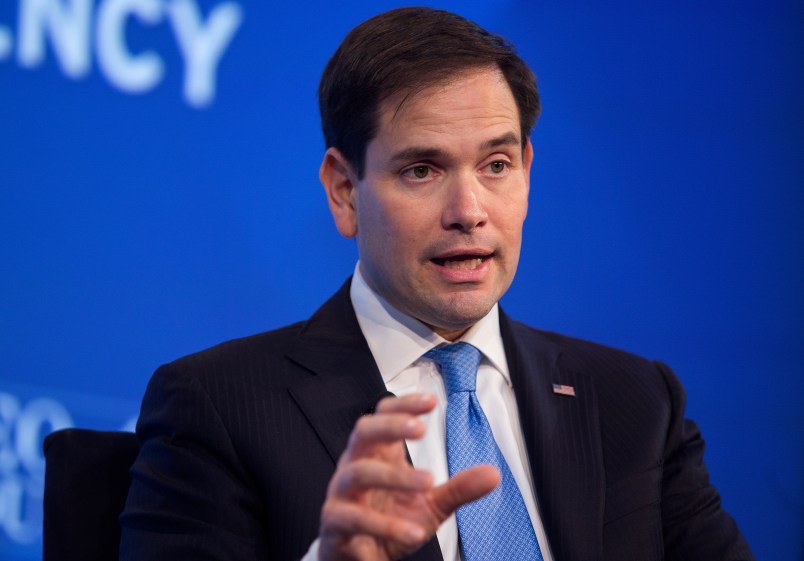Unless you haven’t been paying attention to the American political debate for the last half dozen years, you know that Republicans insist that it is a critical part of fighting terrorism that our leaders talk about “Islam” or “radical Islam” or some phrase that includes the word “Islam” to be able to protect ourselves and win our epic battle against the jihadists. There are more and less sophisticated versions of the argument. And usually presidential candidates will carefully go through the motions of explaining that we have no quarrel with Islam but only “radical Islam” or some subset of extremists. But Marco Rubio appeared on This Week last weekend. And it was a good example of why this seeming hyper-caution is actually pretty important and how in particularly clumsy hands or in the hands of someone new to these issues this approach can lead to major problems.
Coming off the last Democratic presidential debate, this issue again got a big airing, with Republicans attacking all the candidates for refusing to invoke the I-word. So George Stephanopoulos played Hillary Clinton’s remarks and then asked Rubio to respond. Here’s the exchange …
HILLARY CLINTON: I don’t think we’re at war with Islam. I don’t think we’re at war with all Muslims. I think we’re at war with jihadists. We are at war with violent extremism. We are at war with people who use their religion for purposes of power and oppression and, yes, we are at war with those people, but I don’t want us to be painting with two broad a brush.
…GEORGE STEPHANOPOULOS: You saw Secretary Clinton there did not want to use the words radical Islam. Your response.
MARCO RUBIO: I think that’s, I don’t understand it. That would be like saying we weren’t at war with Nazis because we were afraid to offend some Germans who may have been members of the Nazi party, but weren’t violent themselves. We are at war with radical Islam, with an interpretation of Islam by a significant number of people around the world who they believe now justifies them in killing those who don’t agree with their ideology. This is a clash of civilizations. And as I said at the debate earlier this week, there is no middle ground on this. Either they win or we win, and we need to begin to take this seriously.
This exchange got some attention. But as far as I could see it was treated as yet another replay of the same old argument about whether or not you’re willing to say “radical Islam.” But it deserved more attention. Because it was pretty dramatically different from the standard line you hear from mainstream Republicans.
Public diplomacy is not usually long on nuance. So whatever comes after, start with the fact that Rubio directly compares Islam to Nazism, which is a pretty mind-boggling thing for a serious contender for the presidency to say. But what he says after that goes a lot deeper.
Rubio argues that to the extent we’re trying to avoid alienating the bulk of the world’s 1.3 billion Muslims, this larger group is comparable to Nazi party members who simply hadn’t committed atrocities with their own hands. As this crowd is fond of saying, words have meaning and they have consequences. And the clear import of Rubio’s Nazi analogy is that we are in fact at war with Islam itself but that there are many Muslims who haven’t themselves committed acts of terrorism. Read the actual words. That’s the only reasonable interpretation of the analogy as he states it. He doesn’t say it’s comparable to not mentioning Nazism because it might offend all Germans but that it’s like tiptoeing around the word “Nazism” for fear of offending German members of the Nazi party. Again, in this framework all Muslims are comparable to Nazi party members. Just some haven’t gotten their hands dirty.
Now, the rejoinder here is to say, Rubio got tripped up on his words a bit. Or, he knows that the people who he’s been getting trained up by like to see everything in world historical terms and everything is comparable to the fight against Nazism and we all want our pallid day in the sun as a mini-Churchill. So he was just kind of riffing it all together and went a bit further than a presidential candidate should. But that itself is pretty instructive. Both to the extent that Rubio is just a bit reckless and intellectually clumsy but also because once you start making fine distinctions about how we’re at war with “radical Islam” but not “Islam” you’re making distinctions that that the vast majority of the world’s Muslims, translated into different languages, often through hostile media, are not going to easily make. And that’s before you inject politics, derp or just the greenness of a major presidential contender into the mix.
Bottom line: Rubio’s not really ready for prime time. And beyond that, even though it can sometimes be a bit trying to hear people avoid using the adjective which obviously is the common denominator with all violent jihadists, it’s a caution and wisdom that is worth employing. When it comes to statecraft and hearts and minds, our words are not just there to make us feel good or increase our self-esteem. They are tools to communicate, persuade and ultimately get results that we want and need.






